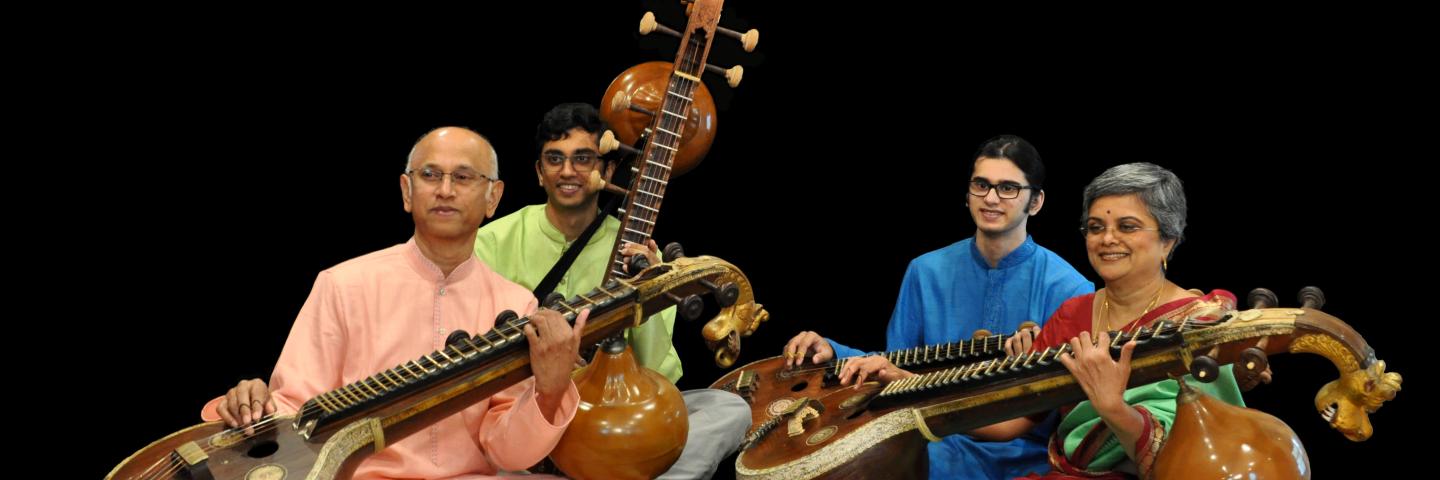ARTIST BIOGRAPHY
 | Traditional Skill/Art Craft: Vina performer/builder Years Awarded: 2018, 2022 Contact Information: Phone: (503)828-2001 Email: vidya_mouli@karaikudivoyage.us Website: https://www.karaikudivoyage.us/ |
Sreevidhya is a tenth-generation descendent from the illustrious Karaikudi Vina Tradition of South India. She moved to the United States in the late 1980s with her husband Chandramouli Narayanan, a ninth-generation descendent, when her husband came to Portland for employment. She embarked on the study of ethnomusicology at the University of Washington.
In the last three decades, she has contributed to the musical tapestry in Oregon through universities and private teaching. Based on students' involvement, she undertakes to teach the Vina in the local school setting for independent study. She often selects students to reside with her to learn the art in depth. Many of the students learn to perform and teach as they advance their careers in various fields. Through her own solo and group performances with her family, she brings the grandeur of the tradition to her community.
Sreevidhya has served as artist-in-residence at the University of Washington and University of Oregon and briefly served as adjunct faculty at the University of Oregon. She has been teaching in the Pacific Northwest for more than three decades preserving the subtle aesthetics and purity of the Karaikudi Vina tradition. With the support of her family, she conducts summer camps in music and Integrative Learning music, yoga, poetry, story narration, math, and writing for children of different age groups in her home setting.
Besides music, she teaches Vina building and maintenance. Her students explore the poetry in musical compositions, language, and meaning to develop the cultural context to the relevance of the practice. She is a founding member of the non-profit organization Dhvani (http://www.dhvani.org/) dedicated to the education, preservation, and dissemination of art forms of India. For more about Sreevidhya and her tradition: http://www.karaikudivoyage.us/
APPRENTICE BIOGRAPHY - Nidhi Yadalam 2022
Nidhi Yadalam is an Indian American musician of South-Indian heritage. She is keen on connecting with her cultural traditions through exploring various styles of Carnatic music and other art forms as well as learning about languages, mythology, and folk narratives. Nidhi has been a student of Sreevidhya Chandramouli for five years and they have been working together to further her knowledge on improvisational, lyrical, rhythmic, and emotive elements of Carnatic music.
Nidhi wishes to ultimately be able to assist her teacher in classes, and mentor her juniors. She believes that being part of imparting this art is important to keeping the tradition alive and evolving for generations to come.
APPRENTICE BIOGRAPHY - Dilisha Patil 2018
Dilisha Patil was just a 13-year-old Indian-American girl when she apprenticed with Sreevidhya in 2018. She was born to first-generation Indian immigrants who introduced her to the Carnatic traditional music where she began with vocal Carnatic music at age four and then began learning the Vina. Vina is a seven-stringed Indian musical instrument and she learned the Karaikudi Vina Tradition that Sreevidhya’s family has been a part of for generations. Patil is very interested in improvision called Tanam where she hopes to create her own after years of training. After this apprenticeship, she wishes to continue her training in Carnatic music, be involved with the community, and keep the tradition alive by spreading awareness.
Q&A WITH THE MENTOR ARTIST
Describe your traditional art.
Body
I will be teaching South Indian Vina and voice in the Karaikudi Vina tradition from Southern India. Karaikudi Vina tradition has a long lineage of Vina players spanning ten generations with my sons (born and brought up in Portland, OR) as the eleventh generation vainikas (Vina players). The uniqueness of the Karaikudi Vina tradition is in the distinctive fingering technique and the fascinating way of employing gamakas passed on through generations. The tradition emphasizes that the fundamental exercises learned to need to be practiced life-long to acquire mastery of the art.
Some of the features of the tradition are: the use of stopping technique with the right-hand, the choice methods in the way of plucking, the use of tala strings to indicate rhythm, the strumming of main strings for effect, the use of individual strings as an expression of inwardly felt pulsations, the techniques employed for faster variations. The tradition is known for the purity of compositional rendition as well as rendering the improvisatory forms ragam, tanam and kalpana-svaras.
Learning and practicing music in this tradition is an integral part of everyday life. It is practiced at homes and performed in several venues based on the individual's interest. Vina is primarily a solo instrument. It is also used to accompany vocals and dance performances. Vina music is performed in devotional events, weddings, and births.
How did you come to learn this tradition?
Body
I learnt the art form from my mother Rajeswari Padmanabhan (grand-daughter of the legendary Karaikudi Subbarama Iyer). I later pursued advanced vocal training from Vairamangalam Lakshmi Narayanan and Suguna Varadachari. I pursued music degrees in Indian Music from University of Madras
Learning art forms is highly emphasized in South Indian culture and Vina is believed to foster the ability to listen to the nuances and subtleties of knowledge. Karaikudi Vina tradition is known for unique techniques in Vina playing passed over ten generations. The polish and embellishment that comes with the structure in this tradition enables one to evolve gradually and learn advanced concepts.
I have had the privilege of learning in gurukulam (student residing with the teacher) style as well as in an institutional setting to advance my training in both systems. It is in my gurukulam setting I derived the immersive experience of deepening the art form. I have observed my mother's teaching methodology in close quarters and assisted her in teaching. I have witnessed her passing on the tradition to visiting students and scholars from USA and Europe. It is through these efforts that the Karaikudi Vina tradition is extensively studied and researched by scholars from across the globe. Such experiences enabled me to continue the tradition beyond national boundaries.
Why is this cultural tradition important to your community?
Body
Karaikudi Vina tradition is an oral tradition that integrates language, philosophy and aesthetic values embedded in the culture. In Indian culture, Vina occupies a coveted position in the hands of goddess Sarasvati who is revered for music and learning. My work in the community as a teacher emphasizes the time-immemorial cultural values passed on through music. Vina, an ancient instrument, has fewer proponents and students today. It is imperative to develop a new generation of students and teachers. The sustenance of Vina tradition has implications for the art form, the artisans and the society at large. I am happy to share my tradition through institutions and private teaching.
The tradition relies on support from patrons which has been dwindling over the years. The present-day societal challenges coupled with changing economic fortunes in Oregon make the dissemination of the tradition more difficult for an independent teacher like me. The assistance provided by the grant will be of great help for the present project as it will require significant amount of time and effort.
Experience/ Honors
Body
-2014- Present: Annual Vina & Vocal performances in Portland, OR
-2018: Presented vocal concert by student Kavya Balasubramanian (8 years of training)
-2017: Presented vocal concert by student Sahana Jayaraman (9 years of training)
-2017: Vina quartet performance with family in Portland, OR
-2015 - Present: Integrative Learning camps during summer in music, instrument maintenance and building, yoga, poetry, storytelling, math and writing
-2016: Vina trio performance with family for Ragamala, Seattle, WA
-2016: Vina concert in Dallas, TX
-2010: Dhrupad & Vina concert at Lewis & Clark college for Dhvani
-2009: Represented the State of Oregon at Kennedy Center, Washington DC 2009: Live performance at the Library of Congress, Washington DC
-2009: Featured artist at the Museum of Natural and Cultural History, University of Oregon
-2006: Vina performance for Ragamala, Seattle, WA
-2005: Received title 'Nada Oli' from Raga Sudha, Chennai
-2005: Conducted a summer apprenticeship and documented Vina making collaborating with Brhaddhvani, a Research and Training center for Musics of the World, Chennai
-2004: Vina duet performance with my mother Rajeswari Padmanabhan at University of Oregon
-2003-Present: Featured Artist in KIT Tropenmuseum, Amsterdam
-2001: Featured performer in Berlin Radio with mother Rajeswari Padmanabhan
-2000: Featured along with mother Rajeswari Padmanabhan in the book Singer and the Song by C.S. Lakshmi (published in 2000)
-1991: Featured performer with mother Rajeswari Padmanabhan for House of World Cultures at the Festival of Stringed instruments by Berlin Museum
-1986-87 – Performed in Nadangi (Doordarshan TV serial on South Indian musical instruments)
Visit OFN's Culture Keepers Roster to learn more about the artist.
Traditional Arts Apprenticeship Program
More OFN programs
OFN main page
